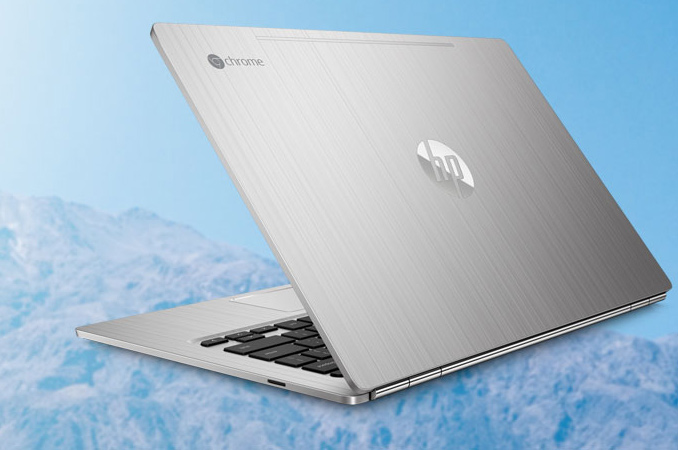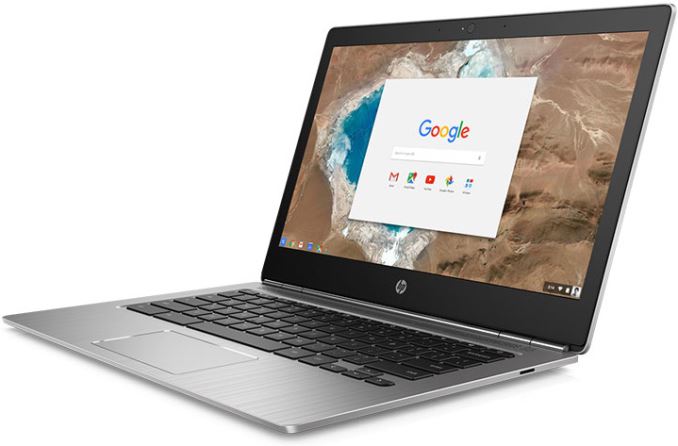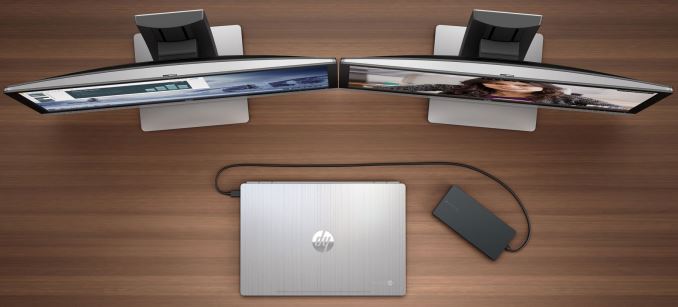HP Unveils Premium Chromebook: 3K Display, Intel Core M, 16 GB of RAM and USB-C
by Anton Shilov on May 3, 2016 8:00 AM EST
HP has announced a new family of Chromebooks, which are powered by Intel’s high-performance processors and feature stylish design, aluminum body, high-resolution display and even Bang & Olufsen speakers. The new laptops will not be as affordable as many other mobile PCs running Google Chrome OS and will not be as powerful as Google’s Pixel, however, this is what HP believes to be the right balance between performance, style, portability and price.
When Acer and Samsung introduced their first notebooks based on Google’s Chrome OS in mid-2011, they praised their low price and mainstream computing capabilities. At the time, Chrome OS was a mystery for most people, netbooks were relatively popular and it made sense for the aforementioned PC makers and Google to address the entry-level segment of the market with something very affordable. As Chrome OS gained traction, PC makers began to install higher-performing components into their Chromebooks. However, they were still not ready to address the high-end market segment with such PCs, which is why Google released its Pixel laptop in 2013. The Chromebook Pixel is one the most advanced and stylish Chromebooks ever made because of its Core i7 “Broadwell” CPU, a display with 2560×1700 resolution and 3:2 aspect ratio. But, the Pixel costs $999 and not all users are ready to invest that sum in a Chromebook. Fortunately, different PC makers offer various systems that attempt to replicate some of the Pixel’s features. HP decided to build its own competitor for Google’s Pixel and while the product is not exactly affordable, it has a better screen than most Chromebooks and a number of other advanced features.
The HP Chromebook 13 sports a 13.3” IPS display with 3200×1800 resolution (QHD+), 170-degree viewing angles and 16:9 aspect ratio, which is good for multimedia applications and video. HP’s latest Chromebook comes in brushed anodized aluminum chassis, it is 12.9 mm thick and weighs 1.29 kilograms (2.86 pounds), which is thinner and lighter than Apple’s MacBook Air 13”. Despite the very high resolution screen, the laptop works up to 11.5 hours on one charge of its 45 Wh battery, according to the manufacturer.
To enable long battery life, HP used Intel’s Skylake-Y system-on-chips to build its Chromebook 13. Various versions of the system are powered by either Pentium or Core M SoCs with two cores, Intel’s HD Graphics 515 (Gen9) core with 24 EUs (execution units) as well as 6W or 4.5W TDP. The system will likely be considerably faster than other Chromebooks running Atom, Celeron or Pentium processors because of the high-performance CPU architecture.
| HP Chromebook 13 Specifications | |||||
| Screen Resolution | 3200×1800 | ||||
| CPU | Intel Core m7-6Y75 | Intel Core m5-6Y57 | Intel Core m3-6Y30 | Intel Pentium 4405Y | |
| Graphics | Intel HD Graphics 515 (Gen9, 24 execution units) | ||||
| RAM | 16 GB | 8 GB | 4 GB | ||
| Storage | NAND flash storage | ||||
| Wi-Fi | 2x2 MIMO 802.11ac Wi-Fi module (?) | ||||
| Bluetooth | Bluetooth 4.2 (?) | ||||
| USB | 2×USB-C, 1×USB-A ports | ||||
| Other I/O | Microphone, stereo speakers, audio jack | ||||
| Thickness | 12.9 mm/0.5 inch | ||||
| Weight | 1.29 kilograms / 2.86 pounds | ||||
| Price | $1029 | $819 | $599 | $499 | |
Depending on the model and price, the HP Chromebook 13 can be equipped with 4, 8 or 16 GB of RAM, an unknown amount of solid-state storage as well as wireless connectivity technologies (a 802.11ac Wi-Fi module with Bluetooth 4.2 is likely, but is not confirmed by HP). HP notes that its system has a full-sized backlit keyboard as well as Band & Olufsen-tuned speakers, which is something new for a Chromebook. The system also has a webcam, three microphones, a 3.5 mm audio port, a SD card reader, one USB Type-A port as well as two USB Type-C ports. The Chromebook 13 uses USB-C for charging and is therefore compatible with a variety of third-party chargers.
With its advanced Chromebook 13, HP offers its Elite USB-C Docking Station ($149), which plugs in to a USB-C port on the PC and enables to connect up two Full HD displays, Gigabit Ethernet as well as multiple USB Type-A devices, such as keyboards or mice.
Four versions of the HP Chromebook 13 should hit the U.S. retail shortly. The most basic model running the Intel Pentium 4405Y processor and equipped with 4 GB of RAM will cost $499, whereas the top-of-the-range system featuring the Intel Core m7-6Y75 and 16 GB of RAM will cost $1029, which is even more than Google’s Pixel.
















145 Comments
View All Comments
MrPete123 - Tuesday, May 3, 2016 - link
I was curious about the usefulness of 16GB myself. How are you running IntellijJ? Are you dual booting?okay - Tuesday, May 3, 2016 - link
I wasn't sure what I wanted in the long run so I set it up with *both* dual boot and crouton.I end up using crouton/ubuntu 80% of the time, ChromeOS 19% of the time, and the dual boot Ubuntu 1% of the time. So yeah the ubuntu dual boot is mostly wasting space.
Fortunately, with IntelliJ installs stand-alone, so you can install it once (on either dual-boot-Ubuntu or crouton-ubuntu) and then simply setup links from the other environment, making it available both places without using more space.
gd22 - Friday, May 6, 2016 - link
One use case scenarios for when larger ram would be worth the extra price is online data Geographic Information Systems work (GIS) When using Google Fusion tables as the data store, and in my experience over 40,000 rows, doing geocoding of human readable addresses to Latitude-Longitude coordinates, and at same time doing data cleanup, slows the browser. Google seems to offload a lot of the geocoding back to the client machine, just my observation.jasonelmore - Tuesday, May 3, 2016 - link
$+219 for 4GB Ram and 100 mhz overclock.. No thanks.. Intel are bat-crap crazy for charging +$100 for 100mhz on that M5Sttm - Tuesday, May 3, 2016 - link
Now can I just buy one of these and then install Debian? Or do they lock the boot loader or something?taisserroots - Tuesday, May 3, 2016 - link
apparently you get a warning on launch, but it runs no VM or dual boottuxRoller - Wednesday, May 4, 2016 - link
Not Debian, but you can install Fedora or arch.herzigma - Tuesday, May 3, 2016 - link
Former Googler here so I'm a little jaded. But the "best" laptop I've ever used is the Dell Chromebook 13 I bought with my own money. A little big for my taste (love my XPS13) but for 90%+ of my work all I need is a browser. And what a browser Chrome under ChromeOS is - super fast, never slows down under load, has a great screen, keyboard, and touchpad, lasts 12 hours easily, never slows down under background tasks (including hangouts), doesn't require any sort of maintenance, care or feeding...I consider myself a power user and still have a desktop for media creation, editing, and serving. But the shear joy of just having everything work is astounding. My old Samsung Chromebook (ARM processor) was fine. But if you're someone who uses their computer all the time it's not too much to pay a premium for a premium experience. So $400 for my Dell Chromebook was totally reasonable and I could imagine paying the $$$ for this HP one.
jabber - Tuesday, May 3, 2016 - link
Yes I have the Dell 13 Chromebook and love it. The whole "It just works!" is so true. It just works every time you power it on. No "Waiting for Windows Updates.." or any of that yesteryear crap. I have one of the HP cheap 32GB Windows laptops here that MS pushed to rival Chromebooks and its laughable. Took me hours to rebuild and configure it and now it wont work...with Chrome! So I have to reset it and try again. I recently upgraded the SSD in this Dell and to swap the SSD, reinstall the OS and login took all of 15 minutes. Windows and OSX are not the future for 98% of us.They just can't keep up.inighthawki - Tuesday, May 3, 2016 - link
That's funny, because when I turned on my Windows laptop this morning, it also just worked. Same with my desktop. Same with both devices the day before, and the day before that, and before that.Are people just really irresponsible with the crapware they install on their devices? Is Chrome working better because there simply isn't a version of "Super System Optimizer 6.3" available? I truly don't understand, because I've had devices that I used actively for 5+ years at a time without ever encountering issues that people seem to constantly say plague Windows devices.